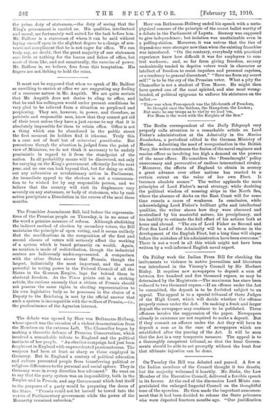The Franchise Amendment Bill, laid before the representa- tives of
the Prussian people on Thursday, is in no sense of the word a genuine measure of reform. Although abolishing the indirect method of election by secondary voters, the Bill maintains the principle of open voting, and it seems unlikely that the modifications in the composition of the' first and second classes of voters will seriously affect the working of a system which is based primarily on wealth. Again, no mention is made of redistribution, though the industrial centres are ludicrously under-represented. A comparison with the other States shows that Prussia, though the largest, industrially the most important, and the most powerful in voting power in the Federal Council of all the States in the German Empire, lags far behind them in electoral freedom. As the Times points out in a striking article, the curious anomaly that a citizen of Prussia should not possess the same rights in electing representatives to his own legislative body as he possesses in the choice of a Deputy to the Reichstag is met by the official answer that such a system is incompatible with the welfare of Prussia,—i.e., the predominance of the Agrarian interest.










































 Previous page
Previous page